 W
WEconomic globalization is one of the three main dimensions of globalization commonly found in academic literature, with the two others being political globalization and cultural globalization, as well as the general term of globalization. Economic globalization refers to the widespread international movement of goods, capital, services, technology and information. It is the increasing economic integration and interdependence of national, regional, and local economies across the world through an intensification of cross-border movement of goods, services, technologies and capital. Economic globalization primarily comprises the globalization of production, finance, markets, technology, organizational regimes, institutions, corporations, and labour.
 W
WThe anti-globalization movement, or counter-globalization movement, is a social movement critical of economic globalization. The movement is also commonly referred to as the global justice movement, alter-globalization movement, anti-globalist movement, anti-corporate globalization movement, or movement against neoliberal globalization.
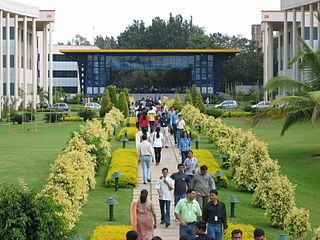 W
WConceptual economy is a term describing the contribution of creativity, innovation, and design skills to economic competitiveness, especially in the global context.
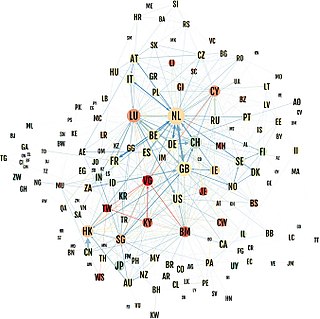 W
WConduit OFC and Sink OFC is an empirical quantitative method of classifying corporate tax havens, offshore financial centres (OFCs) and tax havens.
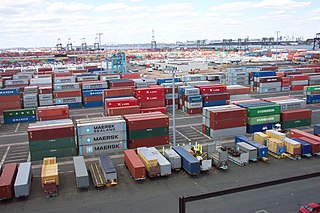 W
WContainerization is a system of intermodal freight transport using intermodal containers. The containers have standardized dimensions. They can be loaded and unloaded, stacked, transported efficiently over long distances, and transferred from one mode of transport to another—container ships, rail transport flatcars, and semi-trailer trucks—without being opened. The handling system is completely mechanized so that all handling is done with cranes and special forklift trucks. All containers are numbered and tracked using computerized systems.
 W
WDecent work is employment that "respects the fundamental rights of the human person as well as the rights of workers in terms of conditions of work safety and remuneration. ... respect for the physical and mental integrity of the worker in the exercise of his/her employment."
 W
WA developing country is a country with a less developed industrial base (industries) and a low Human Development Index (HDI) relative to other countries. However, this definition is not universally agreed upon. There is also no clear agreement on which countries fit this category. A nation's GDP per capita, compared with other nations, can also be a reference point. In general, the United Nations accepts any country's claim of itself being "developing".
 W
WThere are wide varieties of economic inequality, most notably measured using the distribution of income and the distribution of wealth. Besides economic inequality between countries or states, there are important types of economic inequality between different groups of people.
 W
WEconomic liberalism is a political and economic philosophy based on strong support for a market economy and private property in the means of production. Although economic liberals can also be supportive of government regulation to a certain degree, they tend to oppose government intervention in the free market when it inhibits free trade and open competition. Economic liberalism has been described as representing the economic expression of liberalism.
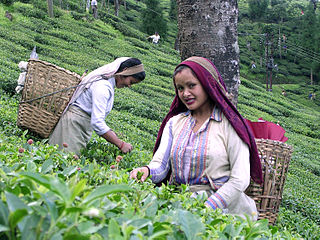 W
WExport-oriented employment refers to employment in multinational corporations' international industrial factories, usually located in developing countries. Such factories produce goods and services for sale in other countries. While these multinational producers have globally expanded women's access to employment, evidence suggests they do so by reinforcing traditional gender roles or creating new gender inequalities. Such gender inequities allow multinational firms to greater exploit profits per worker than they would otherwise due to the decreased labor cost. This decrease in the cost of labor comes as a result of the relegation of women to certain occupations. Studies show that in the quest for lower unit labor costs, export-oriented facilities create poor working conditions.
 W
WFair trade is an arrangement designed to help producers in developing countries achieve sustainable and equitable trade relationships. Members of the fair trade movement add the payment of higher prices to exporters, as well as improved social and environmental standards. The movement focuses in particular on commodities, or products that are typically exported from developing countries to developed countries, but is also used in domestic markets, most notably for handicrafts, coffee, cocoa, wine, sugar, fruit, flowers, and gold. The movement seeks to promote greater equity in international trading partnerships through dialogue, transparency, and respect. It promotes sustainable development by offering better trading conditions to, and securing the rights of, marginalized producers and workers in developing countries. Fair trade is grounded in three core beliefs; first, producers have the power to express unity with consumers. Secondly, the world trade practices that currently exist promote the unequal distribution of wealth between nations. Lastly, buying products from producers in developing countries at a fair price is a more efficient way of promoting sustainable development than traditional charity and aid.
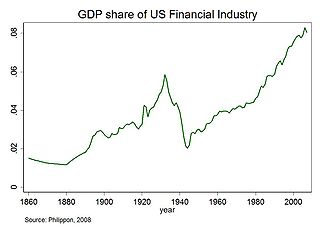 W
WFinancialization is a term sometimes used to describe the development of financial capitalism during the period from 1980 to present, in which debt-to-equity ratios increased and financial services accounted for an increasing share of national income relative to other sectors.
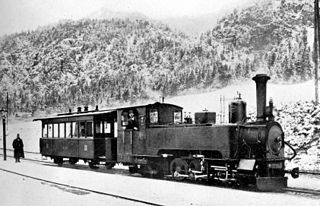 W
W"First globalization" is a phrase used by economists to describe the world's first major period of globalization of trade and finance, which took place between 1870 and 1914. The "second globalization" began in 1944 and ended in 1971. This led to the third era of globalization, which began in 1989 and continues today.
 W
WFood miles is the distance food is transported from the time of its making until it reaches the consumer. Food miles are one factor used when testing the environmental impact of food, such as the carbon footprint of the food.
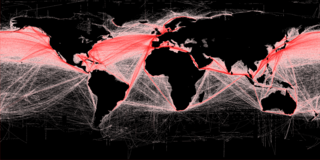 W
WFreight transport is the physical process of transporting commodities and merchandise goods and cargo. The term shipping originally referred to transport by sea but in American English, it has been extended to refer to transport by land or air as well. "Logistics", a term borrowed from the military environment, is also used in the same sense.
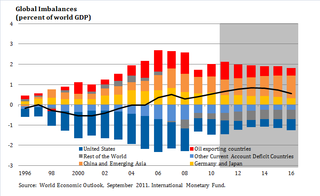 W
WGlobal imbalances refers to the situation where some countries have more assets than the other countries. In theory, when the current account is in balance, it has a zero value: inflows and outflows of capital will be cancelled by each other. Hence, if the current account is persistently showing deficits for certain period it is said to show an inequilibrium. Since, by definition, all current accounts and net foreign assets of the countries in the world must become zero, then other countries become indebted with the other nations. During recent years, global imbalances have become a concern in the rest of the world. The United States has run long term deficits, as well as many other advanced economies, while in Asia and emerging economies the opposite has occurred.
 W
WThe Global South is an emerging term, used by the World Bank and other organizations, identifying countries with one side of the underlying global North–South divide, the other side being the countries of the Global North. As such the term does not inherently refer to a geographical south; for example, most of the Global South is actually within the Northern Hemisphere.
 W
WInternational development or global development is a broad concept denoting the idea that societies and countries have differing levels of "development" on an international scale. It is the basis for international classifications such as developed country, developing country and least developed country, and for a field of practice and research that in various ways engages with international development processes. There are, however, many schools of thought and conventions regarding which are the exact features constituting the "development" of a country.
 W
WInternational inequality refers to the idea of inequality between countries. This can be compared to global inequality which is inequality between people across countries. This may refer to economic differences between countries. As well as medical care and education differences.
 W
WInternational tourism refers to tourism that crosses national borders. Globalization has made tourism a popular global leisure activity. The World Tourism Organization defines tourists as people "traveling to and staying in places outside their usual environment for not more than one consecutive year for leisure, business and other purposes". The World Health Organization (WHO) estimates that up to 500,000 people are in flight at any one time.
 W
WA multinational company(MNC) is a corporate organization that owns or controls production of goods or services in at least one country other than its home country. Black's Law Dictionary suggests that a company or group should be considered a multinational corporation if it derives 25% or more of its revenue from out-of-home-country operations. However, a firm that owns and controls 51% of a foreign subsidiary also controls production of goods or services in at least one country other than its home country and therefore would also meet the criterion, even if that foreign affiliate generates only a few percent of its revenue. A multinational corporation can also be referred to as a multinational enterprise (MNE), a transnational enterprise (TNE), a transnational corporation (TNC), an international corporation, or a stateless corporation. There are subtle but real differences between these terms.
 W
WNeoliberalism or neo-liberalism is the 20th-century resurgence of 19th-century ideas associated with economic liberalism and free-market capitalism. It is generally associated with policies of economic liberalization, including privatization, deregulation, globalization, free trade, austerity, and reductions in government spending in order to increase the role of the private sector in the economy and society; however, the defining features of neoliberalism in both thought and practice have been the subject of substantial scholarly debate. In policymaking, neoliberalism was part of a paradigm shift that followed the failure of the Keynesian consensus in economics to address the stagflation of the 1970s.
 W
WThe North–South divide is a socio-economic and political division of Earth popularized in the late 20th century and early 21st century. Generally, definitions of the Global North is not exclusively a geographical term, and it includes Australia, Canada, most Western European countries, Israel, Japan, New Zealand, Singapore, South Korea, Taiwan (ROC) and the United States. The Global South is made up of Africa, Latin America and the Caribbean, Pacific Islands, and the developing countries in Asia, including the Middle East. It is home to: Brazil, India and China, which, along with Indonesia and Mexico, are the largest Southern states in terms of land area and population.
 W
WThe pollution haven hypothesis posits that, when large industrialized nations seek to set up factories or offices abroad, they will often look for the cheapest option in terms of resources and labor that offers the land and material access they require. However, this often comes at the cost of environmentally unsound practices. Developing nations with cheap resources and labor tend to have less stringent environmental regulations, and conversely, nations with stricter environmental regulations become more expensive for companies as a result of the costs associated with meeting these standards. Thus, companies that choose to physically invest in foreign countries tend to (re)locate to the countries with the lowest environmental standards or weakest enforcement.
 W
WUnder Ministral Order n. 150/2004 of 13 February, issued by the Portuguese Ministry of Finance and consequently updated, Portugal defines an official blacklist of countries and jurisdictions considered for legal and tax purposes as tax havens.
 W
WRegulatory capitalism suggests that the operation maintenance and development of the international political economy increasingly depends on administrative rules outside the legislatures and the courts.
 W
WUneconomic growth, in human development theory, welfare economics, and some forms of ecological economics, is economic growth that reflects or creates a decline in the quality of life. The concept is attributed to leading ecological economist and steady-state theorist Herman Daly, though other theorists can also be credited for the incipient idea. Note Uneconomic growth should not be confused with economic degrowth, the reduction of the size of the economy to increase well-being and sustainability.
 W
WA water footprint shows the extent of water use in relation to consumption by people. The water footprint of an individual, community or business is defined as the total volume of fresh water used to produce the goods and services consumed by the individual or community or produced by the business. Water use is measured in water volume consumed (evaporated) and/or polluted per unit of time. A water footprint can be calculated for any well-defined group of consumers or producers, for a single process or for any product or service.
 W
WIn the foreign exchange market and international finance, a world currency, supranational currency, or global currency is a currency that is transacted internationally, with no set borders.
 W
WWorld-systems theory is a multidisciplinary, macro-scale approach to world history and social change which emphasizes the world-system as the primary unit of social analysis.